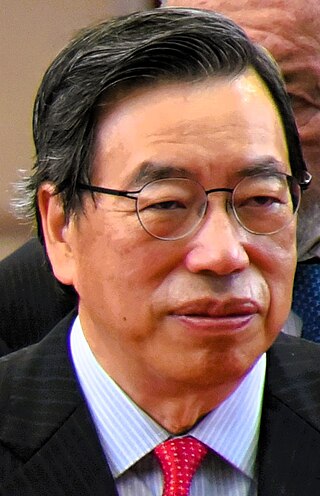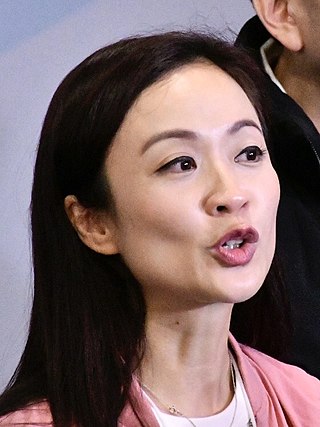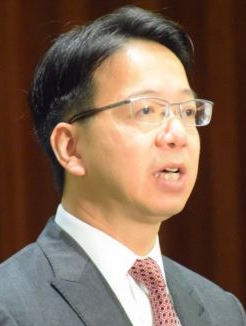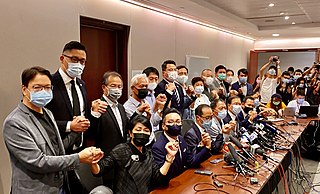
The pro-democracy camp, also known as the pan-democracy camp, is a political alignment in Hong Kong that supports increased democracy, namely the universal suffrage of the Chief Executive and the Legislative Council as given by the Basic Law under the "One Country, Two Systems" framework.

Leung Yiu-chung is a Hong Kong politician. He is a member of the pro-labour Neighbourhood and Worker's Service Centre, which is a part of the pan-democracy camp. He has had a long-standing tenure as a member of the Legislative Council of Hong Kong. Between 1998 and 2016, he represented the New Territories West geographical constituency, and from 2016 to 2020, he represented the District Council (Second) functional constituency. Leung has also served as a member of the Kwai Tsing District Council since 1985.

Andrew Leung Kwan-yuen is a Hong Kong politician who is the current President of the Legislative Council of Hong Kong (Legco), representing the Industrial (First) functional constituency. From October 2012 to October 2016, he was the chairman of Business and Professionals Alliance for Hong Kong (BPA), the second largest party in the legislature.

Starry Lee Wai-king, SBS, JP is a Hong Kong politician and former chairperson of the largest pro-establishment Beijing-loyalist party, the Democratic Alliance for the Betterment and Progress of Hong Kong (DAB). She is a member of the Standing Committee of the National People's Congress (NPCSC), Legislative Councillor for the Kowloon Central geographical constituency, and a former Kowloon City District Councillor. From 2012 to 2016, she was a member of the Executive Council.

Leung Che-cheung, SBS, MH, JP is a former member of Hong Kong Legislative Council and the former chairman of the Yuen Long District Council for Tin Yiu in Tin Shui Wai. He is a member of Democratic Alliance for the Betterment of Hong Kong, a pro-Beijing party in Hong Kong and the president of the New Territories Association of Societies. He was awarded the Silver Bauhinia Star by the Hong Kong SAR Government in 2017.

Yiu Si-wing BBS is a director at China Travel Service and a former member of Legislative Council of Hong Kong.

The Fifth Legislative Council of Hong Kong was the fifth meeting of the legislative branch of the Hong Kong Special Administrative Region Government. The membership of the LegCo is based on the 2012 election. The term of the session is from 1 October 2012 to 30 September 2016, during the term in office of the Chief Executive Leung Chun-ying. Due to the new arrangements agreed in a contentious LegCo vote in 2010, the session consists of the new total of 70 seats in LegCo, ten more than previously, with 35 members elected in geographical constituencies through direct elections, and 35 members in functional constituencies, in which five District Council (Second) functional constituency seats each represent all 18 District councils of Hong Kong voted for by all resident voters in Hong Kong. The Democratic Alliance for the Betterment and Progress of Hong Kong remained the largest party while the pan-democrats secured the one-third crucial minority. Notable new members of the LegCo members include Gary Fan from the new established party Neo Democrats and first openly gay councillor, People Power's Ray Chan Chi-chuen.

The Fourth Legislative Council of Hong Kong was the fourth meeting of the legislative branch of the Hong Kong Special Administrative Region Government. The membership of the LegCo is based on the 2008 election. The term of the session is from 1 October 2008 to 30 September 2012, during the second half of the Donald Tsang's administration and first two months of the Leung Chun-ying's term in office. The meeting place was moved from the Legislative Council Building to the new built Legislative Council Complex in 2011. The Democratic Alliance for the Betterment and Progress of Hong Kong remained the largest party with 10 seats. Notable newcomers to the Legislative Council included Regina Ip, Priscilla Leung, Wong Yuk-man, Tanya Chan, and Paul Tse.

The Business and Professionals Alliance for Hong Kong (BPA) is a pro-Beijing, pro-business political party in Hong Kong. Chaired by Lo Wai-kwok, the party is currently the second-largest party in the Legislative Council of Hong Kong, holding eight seats. It also has two representatives in the Executive Council and five seats in the District Councils.

The Third Legislative Council of Hong Kong was the meeting of the legislative branch of the Hong Kong Special Administrative Region Government. The membership of the LegCo is based on the 2004 election. The term of the session was from 1 October 2004 to 30 September 2008, during the second half of the Tung Chee-hwa's administration until his resignation in 2005 and was replaced by Donald Tsang for the rest of the term, and also the beginning of the third term of Chief Executive after Tsang won in the 2007 Election. The Democratic Alliance for the Betterment of Hong Kong (DAB) became the largest party with 10 seats. Notable newcomers to the Legislative Council included Leung Kwok-hung, Alan Leong, Ronny Tong, Albert Cheng, and Jeffrey Lam.

Andrew Wan Siu-kin is the former vice-chairman of the Democratic Party and a former member of the Kwai Tsing District Council for Shek Yam constituency. He was elected in the 2016 Hong Kong Legislative Council election through New Territories West.

The Sixth Legislative Council of Hong Kong was the sixth meeting of the legislative branch of the Hong Kong Special Administrative Region Government. Running from 1 October 2016 to 31 December 2021, it was the longest legislative session in Hong Kong history, lasted for five years and three months. The term of the session was originally from 1 October 2016 to 30 September 2020, but was extended by the National People's Congress Standing Committee (NPCSC) due to the postponement of the 2020 Legislative Council election.

Lau Siu-lai is a Hong Kong educator, academic, activist, and politician. She is a sociology lecturer at the Hong Kong Polytechnic University's Hong Kong Community College and the founder of Democracy Groundwork and Age of Resistance. In 2016, Lau was elected to the Legislative Council, representing the Kowloon West geographical constituency until she was disqualified by the court on 14 July 2017 over her oath-taking manner at the inaugural meeting of the Legislative Council on 12 October 2016.

Eddie Chu Hoi-dick is a Hong Kong social activist and politician. He is a member of the Local Action and founder of the Land Justice League which are involved in conservation and environmental movements. He is known for his actions against the demolition of the Edinburgh Place Ferry Pier and Queen's Pier in 2006 and 2007 and Choi Yuen Tsuen in 2009 and 2010. He was elected to the Legislative Council of Hong Kong in the 2016 Hong Kong Legislative Council election in New Territories West. He resigned from the Legislative Council on 28 September 2020, citing that he would not serve in an "appointed legislature" after Beijing had extended the legislators' terms by a year.

Edward Yiu Chung-yim is a Hong Kong academic, scholar and former politician who is currently an associate professor of property at the University of Auckland Business School. He is a former member of the Legislative Council of Hong Kong elected in the 2016 Legislative Council election representing the functional constituency of Architectural, Surveying, Planning and Landscape. On 14 July 2017, Yiu was disqualified by the court over his manner on oath of office at the inaugural meeting of the Legislative Council on 12 October 2016 as a result of the oath-taking controversy.
The Hong Kong Legislative Council members' oath-taking controversy was a series of events surrounding the oaths of office of a dozen pro-democracy and localist camp members-elect of the Legislative Council of Hong Kong (LegCo) on 12 October 2016 which have resulted in the disqualification of six members, Sixtus "Baggio" Leung and Yau Wai-ching of Youngspiration, who were unseated by the court on 15 November 2016, and Leung Kwok-hung, Nathan Law, Yiu Chung-yim and Lau Siu-lai on 14 July 2017.

The 2018 Kowloon West by-election was held on 25 November 2018 after the incumbent pro-democracy Legislative Councillor Lau Siu-lai of Kowloon West was disqualified from the Legislative Council of Hong Kong (LegCo) after the oath-taking controversy resulted in the disqualifications of the six pro-democracy and localist legislators. It followed the by-election of four other vacated seats on 11 March 2018. Chan Hoi-yan, a nonpartisan backed by the pro-Beijing camp won over veteran democrat Lee Cheuk-yan of the Labour Party, a backup candidate for the pro-democracy camp after Lau's candidacy was disqualified.

The 2018 Hong Kong Legislative Council by-election was held on 11 March 2018 for four of the six vacancies in the Legislative Council of Hong Kong (LegCo) - the Hong Kong Island, Kowloon West and New Territories East geographical constituencies and the Architectural, Surveying, Planning and Landscape functional constituency - resulting from the disqualification of six pro-democrat and localist camp Legislative Council members over the 2016 oath-taking controversy. The by-election for the two other seats was not held due to pending legal appeals by the two disqualified legislators.

On 11 November 2020, 15 Hong Kong pro-democracy members of the Legislative Council announced their resignations in protest against the decision of the National People's Congress Standing Committee (NPCSC) which bars Legislative Council members from supporting Hong Kong independence, refusing to recognise Beijing's sovereignty over Hong Kong, seeking help from "foreign countries or foreign forces to interfere in the affairs of the region" or committing "other acts that endanger national security" that resulted in the disqualification of pro-democracy legislators Alvin Yeung, Dennis Kwok, Kwok Ka-ki and Kenneth Leung. In July 2020, the four had been barred from running in the subsequently postponed Legislative Council election originally scheduled for September 2020. The resignation en masse left the Legislative Council membership dwindled to 43 out of the total number of 70 seats, with virtually no opposition for the first time since the 1997 handover.
The election for the President of the Third Legislative Council took place on 6 October 2004 for members of the 3rd Legislative Council of Hong Kong to among themselves elect the President of the Legislative Council of Hong Kong for the duration of the council. Rita Fan from the pro-Beijing camp defeated Albert Ho, a democrat, and was re-elected as widely expected.





















